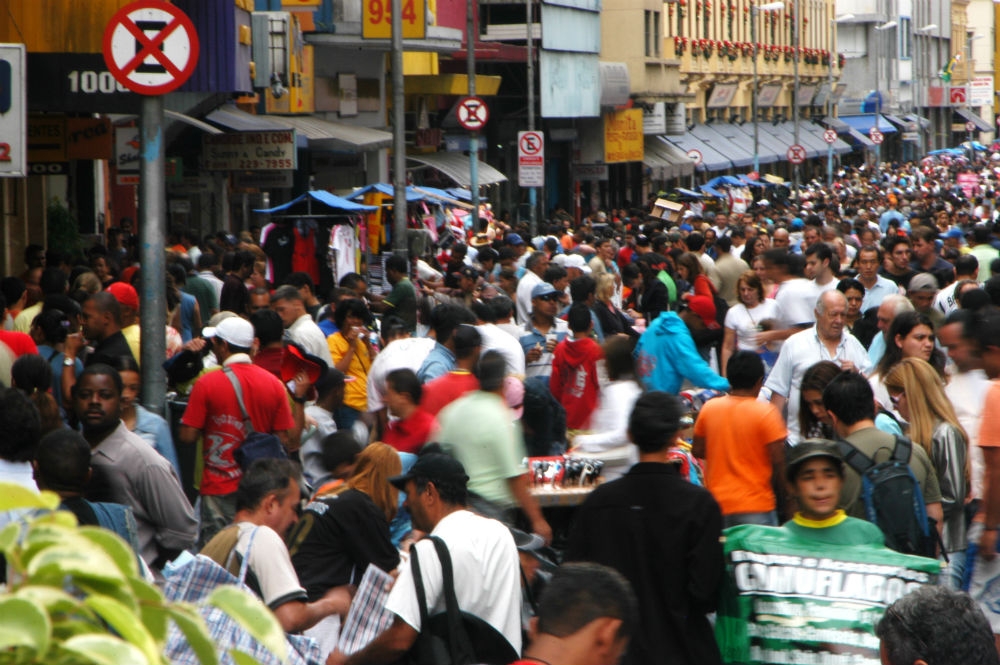

Only 13.8% of the workforce has jobs in sectors not badly hit by social isolation according to a research network set up to propose ways of improving the quality of government policies for dealing with the crisis (photo: rua Vinte e Cinco de Março in São Paulo / Eduardo Cesar, Pesquisa FAPESP)
Only 13.8% of the workforce has jobs in sectors not badly hit by social isolation according to a research network set up to propose ways of improving the quality of government policies for dealing with the crisis.
Only 13.8% of the workforce has jobs in sectors not badly hit by social isolation according to a research network set up to propose ways of improving the quality of government policies for dealing with the crisis.

Only 13.8% of the workforce has jobs in sectors not badly hit by social isolation according to a research network set up to propose ways of improving the quality of government policies for dealing with the crisis (photo: rua Vinte e Cinco de Março in São Paulo / Eduardo Cesar, Pesquisa FAPESP)
By José Tadeu Arantes | Agência FAPESP – In the economic and social crisis triggered by the COVID-19 pandemic, 83.5% of Brazilian workers are in vulnerable situations: 36.6% because they are in the informal economy and 45.9% because they are employed in industries that have been badly hit by the crisis. People with jobs in essential sectors that have not contracted as sharply or that have even expanded account for only 13.8% of the occupied workforce.
These numbers are from the Solidarity Research Network (Rede de Pesquisa Solidária), a group of more than 40 researchers in the humanities, exact sciences and biological sciences based in Brazil and elsewhere.
“The network was created to propose ways of improving the quality of federal, state and municipal government policies in the midst of the crisis unleashed by COVID-19. Doing so requires rigorous data collection, the production of trustworthy information, indicators and models, and analysis of the public policies implemented and the public response,” said sociologist Rogério Barbosa, a member of the network’s steering committee.
Barbosa is affiliated with the Center for Metropolitan Studies (CEM), one of the Research, Innovation and Dissemination Centers (RIDCs) funded by FAPESP.
Barbosa is currently completing a project on income inequality under a postdoctoral scholarship from FAPESP and under Marta Arretche, the principal investigator.
As defined in the study, vulnerable workers are those who risk losing their jobs or a significant proportion of their income during the period of social isolation needed to contain the pandemic. The survey took into account different social groups based on gender, ethnicity and schooling, as well as regional variations.
The results show a pattern of vulnerability that mirrors the structural inequalities of Brazilian society. Black men and women constitute the most vulnerable groups, accounting for most informal workers (when working at all) not covered by employment contracts or social security, meaning that they can be terminated practically at no extra cost.
Women in general and black women in particular are also highly vulnerable, as they often work in economic activities that are considered nonessential, such as domestic service, and that have mostly been suspended without pay.
Workers in the North and Northeast regions are highly vulnerable, as the informal economy is far more prevalent there than in the South, Southeast and Center-West regions.
“But the study also revealed a new dimension of vulnerability: white men and women who have a university degree and a stable job but who work in sectors that are not considered essential or that are considered essential but have been badly hurt by the crisis,” Barbosa said. “The emergence of this group, which we could call ‘newly vulnerable,’ is one of the novelties produced by the pandemic.” Nevertheless, the study showed that the “traditionally vulnerable” are more vulnerable than the “newly vulnerable.”
Vulnerability ratings
Vulnerability was rated on the basis of three categories of worker status: high instability, referring to self-employed workers and informal employees; medium instability, covering domestic workers and other self-employed workers with formal contracts, as well as small business owners and their employees; and low instability, consisting of employees of medium-sized and large companies, statutory government employees, members of the armed services, and medium-sized and large employers.
“Domestic workers are the most vulnerable group, followed by beauticians,” Barbosa said. “At the opposite end of the spectrum, employees of state and city governments are the least vulnerable, along with supermarket and hypermarket employees.”
In addition to in-depth studies, which may be of medium to long duration, the Solidarity Research Network also publishes information to educate the public about the pandemic.
The other members of the steering committee in addition to Barbosa are Glauco Arbix, Lorena Barberia and João Paulo Veiga of the University of São Paulo (USP); Graziela Castello of the think tank CEBRAP, the Brazilian Center of Analysis and Planning; Fabio Senne of NIC.br, the implementation arm of the Brazilian Internet Steering Committee; José Eduardo Krieger of the Heart Institute (INCOR) at Hospital das Clínicas, the general hospital run by the University of São Paulo Medical School (FM-USP); Luciana Lima of the Federal University of Rio Grande do Norte (UFRN); and Ian Prates of CEBRAP, USP and Social Accountability International.
Republish
The Agency FAPESP licenses news via Creative Commons (CC-BY-NC-ND) so that they can be republished free of charge and in a simple way by other digital or printed vehicles. Agência FAPESP must be credited as the source of the content being republished and the name of the reporter (if any) must be attributed. Using the HMTL button below allows compliance with these rules, detailed in Digital Republishing Policy FAPESP.





